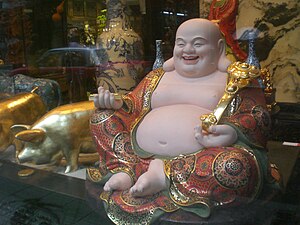The Mystic Knot is one of the most often used symbols in feng shui. Being a combination of six times the infinity symbol, this feng shui knot symbolizes a long and happy life full of good fortune. Mystic knot is sometimes referred to as the endless knot, because it looks like it swallows its own tail.
In Buddhism, the mystic knot is one of the 8 magical auspicious objects. This symbol implies there is no beginning and no ending, reflecting Buddhist philosophy of endless rounds of birth and rebirth. As a feng shui cure, the mystic knot represents a harmonious flow of auspicious energy uninterrupted by any setbacks, accidents or misfortunes.
It is believed that the presence of the feng shui mystic knot will benefit every aspiration of your life, thus this feng shui symbol is often used in feng shui amulets for love, abundance, feng shui protection amulets, feng shui for career and other feng shui applications.
Showing posts with label good fortune. Show all posts
Showing posts with label good fortune. Show all posts
Sunday, December 19, 2010
3 Legged Toad With Coins
Attract plenty of wealth into your home with our Three-legged toads with coins. The frog is a very auspicious creature and is considered to be conducive good fortune. Place the toad in any of the corners diagonally opposite your front door for best effect. You may have more than one toad, but keep the number nine or below. Keep these three-legged toads below the table, couch or other discreet public areas of your home, and never in the bedroom.
Monday, November 22, 2010
Laughing Buddha
 Image via Wikipedia
Image via WikipediaPlace this Laughing Buddha in your home and display him in the Northwest to bring peace and harmony to the household and to attract good fortune for the residents.
Labels:
fulfilling goals,
good fortune,
happiness,
harmony,
life-fulfillment,
peace
Elephant: The Sacred Symbol
Elephant is regarded as the most wondrous creature ever created and is greatly admired. According to Buddhist beliefs, elephants are celestial animals and one of the sacred treasures of Buddha. Throughout time, these regal animals have come to symbolize many things including:
- Wisdom
- Power
- Dignity
- Intelligence
- Strength
- Longevity
- Virility
- Fidelity
- Good luck
- Good fortune
- Success
How to Place a Feng Shui Elephant
There are many applications of the use of elephants in feng shui depending on the material of the elephant and its placement in the home or office. The following are some of the more common applications.- Placing a statue of an elephant, or a pair of elephants, at the front door brings good luck, protection and strength to the household. These elephants are sometimes referred to as elephants of many blessings. It is believed that these elephants should have their trunks facing upwards as that represents prosperity, good luck and victory. Some people believe that elephants with their trunks facing downward represent longevity and conception.
- Elephants always used as guardians and protectors of the household involves them keeping the powers that you attract and maintain inside the house. The elephants act as housekeepers as they guard the door, keeping the powers safely inside.
- An elephant, or a pair of elephants, displayed in the bedroom promotes love and faithfulness between two people. The statues can also be placed in a study or office to enhance the love between couples.
- A statue of a mother elephant and its baby is as symbol of the love and bonding between a mother and her children and will make that bond grow even stronger
- A symbol of fertility, couples that want to have a child, or more children, should place elephant statues in their bedroom. Often a statue or a group of seven elephants is used in the bedroom for fertility because in feng shui the number seven represents children. A statue of a mother and baby elephant can be used to represent fertility.
- Using elephant symbols to bring knowledge and academic success to children is another feng shui application of these magnificent creatures. Place a statue in a child’s bedroom, on the desk, or wherever he or she does homework.
- Placing a statue of a frog on an elephant or a monkey on an elephant promotes career stability.
Saturday, March 27, 2010
The Mystery of Feng Shui

Feng Shui is an ancient art and science developed over 3,000 years ago in China.
It is a complex body of knowledge that reveals how to balance the energies of any given space to assure the health and good fortune for people inhabiting it.
Feng means wind and shui means water. In Chinese culture wind and water are associated with good health, thus good feng shui came to mean good fortune, while bad feng shui means bad luck, or misfortune.
Feng Shui is based on the Taoist vision and understanding of nature, particularly on the idea that the land is alive and filled with Chi, or energy. The ancient Chinese believed that the land's energy could either make or break the kingdom, so to speak. The theories of yin and yang, as well as the five feng shui elements, are some of the basic aspects of a feng shui analysis that come from Taoism.
Subscribe to:
Posts (Atom)


